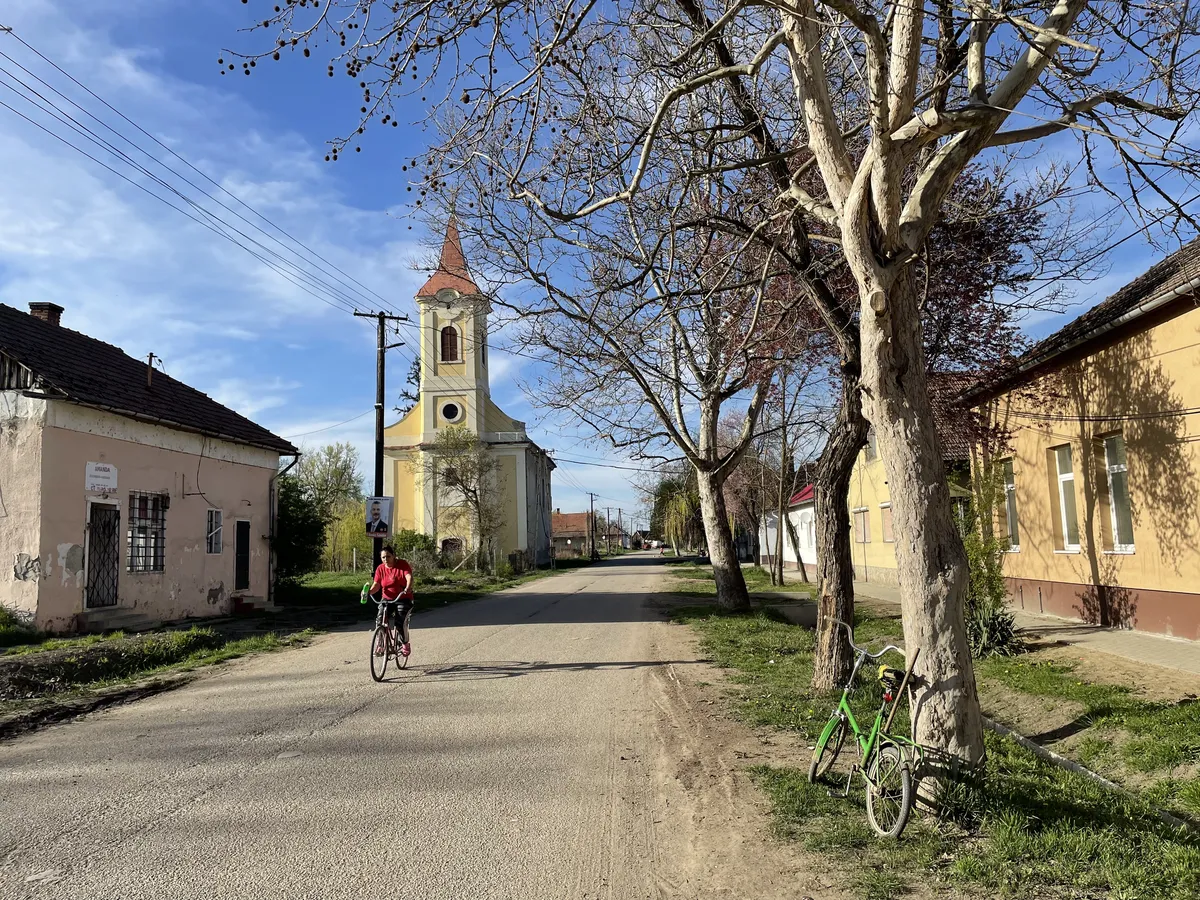Russia’s invasion of Ukraine has set in motion a new collision path between the conservative who secured his fourth consecutive win as Hungary’s prime minister earlier this month and the European Union.
Gunter Verheugen can still remember the passions of a rose-tinted past, when the courtship between Hungary and the European Union was just beginning, and when one of its most attractive young protagonists was a student leader named Viktor Orban.
It was 1989 when Mr. Verheugen, a German politician, first met Mr. Orban.
“We had a short conversation, and he said, ‘we will make Hungary a free and democratic country,’ ” he recalls.
“That is what he said. And I had absolutely no reason to doubt.”
Fifteen years later, Mr. Verheugen presided over the entry of Hungary and nine other countries into the European Union as Commissioner for Enlargement and European Neighbourhood Policy.
But the romance with Hungary has long since ended, and one of the pressing questions for Europe is whether, with war raging in Ukraine, it is now prepared to deliver a measure of tough love to a leader Mr. Verheugen says has become “a completely different person.”
Mr. Orban, first elected Hungary’s Prime Minister in 1998, is described by former associates as a “dictator without terror,” and by critics as the man who has ended the country’s brief dalliance with democracy. Supporters call him a prophet protecting his homeland from the liberal poisons of Western Europe.
Already one of the most divisive forces in Europe, Mr. Orban was newly strengthened by his fourth consecutive electoral win earlier this month.
A conservative who has railed against what he calls LGBTQ ideology, stripped courts of judges and media outlets of independence – all while overseeing a huge accumulation of wealth by friends and family – Mr. Orban has sparred with the European Union while maintaining pleasantries with Vladimir Putin, the Russian leader.
Mr. Orban is “the Trojan horse of the Putin regime within the EU,” says Daniel Kelemen, a Rutgers University political scientist.
Russia’s invasion of Ukraine has, however, set in motion a new collision path between the EU and the authoritarians who have flourished in its midst. European member states have discovered new resolve to oppose the Kremlin.
Now, after years of anxious indecision, European leaders say they are preparing to take on Mr. Orban, too. For the first time since he returned to power in 2010, he faces a resistance that could punish him for weakening Hungarian democracy.
In February, the European Court of Justice ruled that the EU can withhold funds from member states that do not uphold the rule of law. On April 5, European Commission President Ursula von der Leyen pledged to begin applying that regulation to Hungary, which has taken billions of euros in EU money to reshape its cities and build a new class of oligarchs, many with close ties to Mr. Orban.
The stakes have perhaps never been higher, as Mr. Orban seeks to boost the fortunes of far-right ideologues elsewhere. A Hungarian bank provided a €10.7-million loan to French presidential candidate Marine Le Pen, who has advanced to a runoff vote on April 24 against centrist President Emmanuel Macron.
If Mr. Orban can “help get an ideological ally and a wannabe authoritarian like Le Pen into a major member state, that would be a major victory for him,” says Prof. Kelemen, who has written extensively on Europe. “Because then, he would have really succeeded in making the EU completely safe for politicians like him.”
At home, Mr. Orban sits safe atop an electoral fortress largely of his own making. Political scientists say he has remade Hungary into an electoral autocracy that uses levers of state control – over the press and courts, in particular – to safeguard ballot-box success. His April election win gave him a two-thirds majority that once again places the constitution in his hands. It was “a victory so big that you can perhaps see it from the moon, and certainly from Brussels,” Mr. Orban said in celebration.
“Everyone who is a Christian and patriot in this country is happy about this. We expected a win but not as big a landslide as it was,” says Zoltan Osztie, a prominent Catholic priest who is a former national president of Hungary’s Association of Christian Intellectuals. He called Hungary’s leader a pioneer and prophet, crediting Mr. Orban with upholding the three pillars of Hungarian society: God, homeland and family.
Yet there are also signs that Mr. Orban has grown more vulnerable. Cracks have formed in his relationship with Poland, which has in recent years partnered with Hungary to rebuff European concerns about democratic backsliding. In early April, however, Polish st Jaroslaw Kaczynski publicly rebuked Mr. Orban for his refusal to condemn Russian atrocities in Ukraine. “When Orban says that he cannot see what happened in Bucha, he must be advised to see an eye doctor,” Mr. Kaczynski said.
Hungary’s financial situation has also grown more precarious. In November, it capped prices on basic foodstuffs and fuel, with gasoline now selling at a one-third discount compared with other parts of Europe. Subsidized goods have proven costly, and Hungary’s coffers have already been starved of some coronavirus recovery funds withheld by the EU. Hungary spent 72 per cent of its planned annual deficit in the first quarter alone.
The forint has sunk to record lows against the euro, and the country’s central bank has swiftly raised interest rates. Even before the spike in fuel prices, Dutch bank Rabobank reported that Hungary is, by some measures, second only to Argentina in economic vulnerability among emerging markets. Mr. Orban is on course for a “disaster,” and without some change “he cannot survive economically,” says Arpad Szekely, a former Hungarian ambassador to Russia.
Meanwhile, Mr. Orban’s Eastern Opening policy, a decade-old plan to economically distance his country from Europe while building its trade with Russia and China, faces an uncertain future. “Russia had the ambition to appear as an alternative to the EU in Central Europe,” says Tibor Navracsics, a close associate of Mr. Orban who is a former Hungarian member of the European Commission. Mr. Orban has broken ranks with other EU countries and agreed to pay for Russian natural gas in rubles.
But there are now real questions about how much presence Russia can maintain “in the Central European region as an economic power,” he says. Instead, Mr. Navracsics sees the invasion of Ukraine as likely to bring Hungary closer to the EU. And, he adds, the EU threat to withdraw funding is “a strong point for the European Commission to push the Hungarian government towards some political concessions. That’s clear.”
In 2012, the village of Tiszabo earned the title of Hungary’s poorest place. A largely Roma agricultural outpost 130 kilometres southeast of Budapest, “almost everyone in this village lived on aid,” Mayor Laszlo Bruna says.
A decade later, Tiszabo earned a very different kind of title: It was the most populous among the 36 Hungarian villages that cast more than 90 per cent of their votes for Fidesz, Mr. Orban’s party, in the April election. Of 972 voters in Tiszabo, only 12 marked ballots for other parties.

Laszlo Bruna, the mayor of Tiszabo, which was once named the poorest place in Hungary. NATHAN VANDERKLIPPE/THE GLOBE AND MAIL
“This village is like a big family. Everyone knows everyone. And if I say to people here that from now we are with Fidesz, they will follow me,” Mr. Bruna says.
They are following him to a party that has showered them with gifts.
Tiszabo is today a village transformed, with a modernized medical clinic, renovated mayor’s office, improvements to the school, resurfaced roads, a shiny new athletic centre and a construction site where a daycare will stand with space, the mayor estimates, for up to 200 children. The village population is just over 2,000. A sign at that site shows it is being built with an EU grant worth $1.33-million.
A short walk away, Mr. Bruna dines al fresco on a beef stew made from one of his cows slaughtered the previous day.
“A lot of people don’t understand why Fidesz got this majority. I have a very simple answer for that. Fidesz helps everyone,” he says, citing the creation of jobs and businesses. Tiszabo now even boasts an ice-cream shop.

Once Hungary’s poorest village, Tiszabo has received substantial state funds for new construction and is now one of the strongest electoral supporters of Prime Minister Viktor Orban. NATHAN VANDERKLIPPE/THE GLOBE AND MAIL
Such generosity is much less lavish in places that stand against Fidesz. “If you are an opposition mayor, your city doesn’t get any subsidies. They will even administratively block European funding from being used in your city,” says Peter Marki-Zay, the mayor of Hodmezovasarhely, a small city in the country’s southeast.
He is also the man who was briefly seen as perhaps capable of unseating Mr. Orban. Mr. Marki-Zay led a coalition of opposition parties to run against Mr. Orban in the April 3 election. It was the “last chance for the opposition to gain power,” says Laurent Pech, a scholar of European Law at Middlesex University London. Mr. Marki-Zay was crushed.
“This is game over I think, now, for good,” Prof. Pech says. “There is no way the regime will collapse through elections.”
Mr. Marki-Zay, who holds a Canadian passport after living for several years in Richmond Hill and Markham, Ont., agrees. His campaign, he argues, did not have a chance against a Hungarian leader who has amassed sweeping powers over the past 12 years.
Over the entire course of the election, public broadcast channel M1 gave Mr. Marki-Zay just five minutes of air time, which it was legally obligated to provide.
On Thursday night, Mr. Marki-Zay was invited back to M1. It was, he says, the kind of cosmetic concession Mr. Orban might offer to mollify critics. The election is over and Mr. Marki-Zay is no longer a threat. And hours before he appeared on M1, Hungary shut down Tilos, a small Budapest independent radio station.
Those close to Mr. Orban say they hope Hungary can mend fences with the EU. There is scope to amend the financial underpinnings of the public broadcaster and make it more open to opposition parties, says Mr. Navracsics, the former European commissioner. “I hope there will be a change,” he says.” Problems with Brussels “could be healed by political compromises.”
Hungary’s need for the European Union, and Europe’s newfound sense of purpose in battling Russia, gives Brussels a clear opportunity to tackle Mr. Orban, too, argues Akos Hadhazy, an opposition member of parliament. “If ever there was a time for the EU to realize how dangerous this man is, it’s now,” he says.
Mr. Hadhazy is one of Hungary’s closest students of corruption after falling out with Mr. Orban’s party in 2013 over a graft case he made public. Mr. Hadhazy’s research forms the basis for some of the European Union’s allegations against Mr. Orban.
Starving Mr. Orban of money is the only way to effect change, he argues. An estimated €3-billion goes to corruption in Hungary every year. The edifice of Mr. Orban’s power is built on liberal spending to secure support from all levels of society, from oligarchs to village mayors, Mr. Hadhazy says. Without it, he says, the Prime Minister’s electoral support will begin to erode.
Still, few harbour much hope.
Brussels, after all, needs the Hungarian leader on its side to act against Russia, lest he veto sanctions or other measures. It needs Poland, too, to keep welcoming Ukrainian refugees.
Arguments are already being made that it’s better to keep Mr. Orban inside Europe’s boundaries than to push him away.
“My advice to my successors in Brussels is to think twice” about coming down hard on Hungary, says Mr. Verheugen, the former Commissioner for Enlargement, lest it drive Mr. Orban even further away.
“The question is what will happen in the area between the Baltic Sea and the Black Sea if European integration falls apart?” he asks. “It must not fail. If it fails, I promise you – then Ukraine is only the beginning of something very terrible.”
NATHAN VANDERKLIPPE
INTERNATIONAL CORRESPONDENT
The Globe and Mail, April 18, 2022

